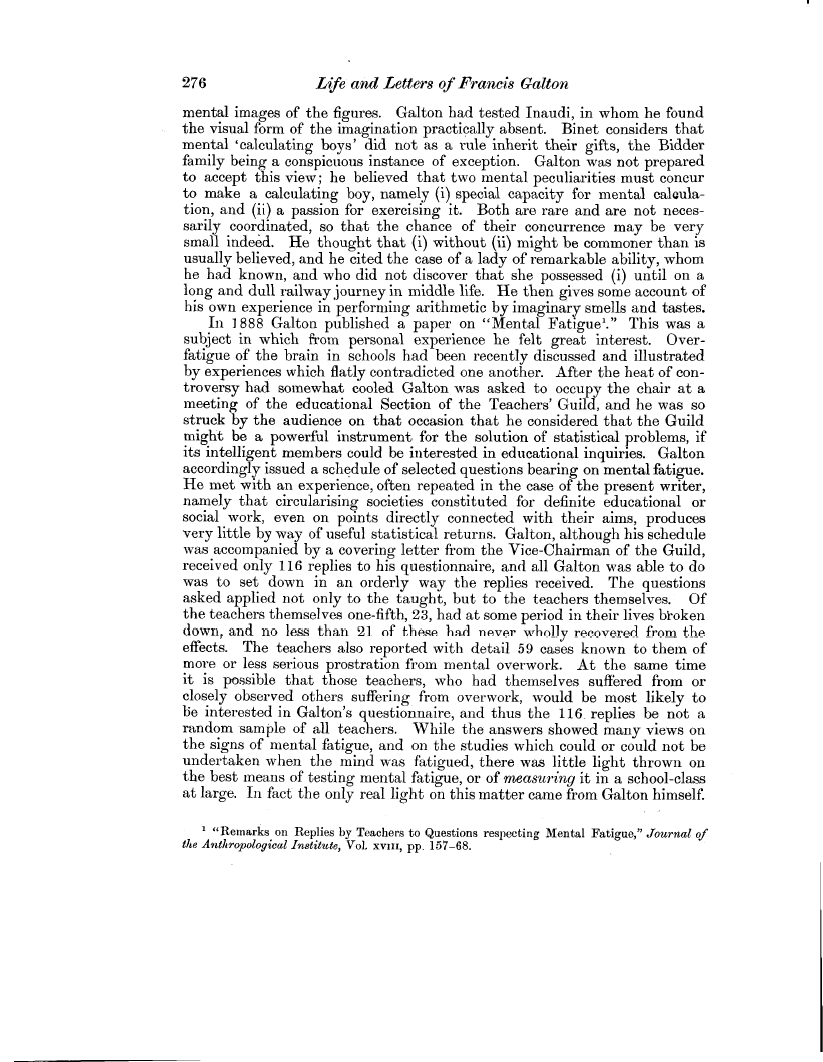276 Life and Letters of Francis Galton
mental images of the figures. Galton had tested Inaudi, in whom he found the visual form of the imagination practically absent. Binet considers that mental 'calculating boys' did not as a rule inherit their gifts, the Bidder family being a conspicuous instance of exception. Galton was not prepared to accept this view; he believed that two mental peculiarities must concur to make a calculating boy, namely (i) special capacity for mental calculation, and (ii) a passion for exercising it. Both are rare and are not necessarily coordinated, so that the chance of their concurrence may be very small indeed. He thought that (i) without (ii) might be commoner than is usually believed, and he cited the case of a lady of remarkable ability, whom he had known, and who did not discover that she possessed (i) until on a long and dull railway journey in middle life. He then gives some account of his own experience in performing arithmetic by imaginary smells and tastes.
In 1888 Galton published a paper on "Mental Fatigue'." This was a subject in which from personal experience he felt great interest. Overfatigue of the brain in schools had been recently discussed and illustrated by experiences which flatly contradicted one another. After the heat of controversy had somewhat cooled Galton was asked to occupy the chair at a meeting of the educational Section of the Teachers' Guild, and he was so struck by the audience on that occasion that he considered that the Guild might be a powerful instrument for the solution of statistical problems, if its intelligent members could be interested in educational inquiries. Galton accordingly issued a schedule of selected questions bearing on mental fatigue. He met with an experience, often repeated in the case of the present writer, namely that circularising societies constituted for definite educational or social work, even on points directly connected with their aims, produces very little by way of useful statistical returns. Galton, although his schedule was accompanied by a covering letter from the Vice-Chairman of the Guild, received only 116 replies to his questionnaire, and all Galton was able to do was to set down in an orderly way the replies received. The questions asked applied not only to the taught, but to the teachers themselves. Of the teachers themselves one-fifth, 23, had at some period in their lives broken down, and no less than 21 of these had never wholly recovered from the effects. The teachers also reported with detail 59 cases known to them of more or less serious prostration from mental overwork. At the same time it is possible that those teachers, who had themselves suffered from or closely observed others suffering from overwork, would be most likely to be interested in Galton's questionnaire, and thus the 116. replies be not a random sample of all teachers. While the answers showed many views on the signs of mental fatigue, and on the studies which could or could not be undertaken when the mind was fatigued, there was little light thrown on the best means of testing mental fatigue, or of measuring it in a school-class at large. In fact the only real light on this matter came from Galton himself.
1 "Remarks on Replies by Teachers to Questions respecting Mental Fatigue," Journal of the Anthropological Institute, Vol, xviii, pp. 157-68.

